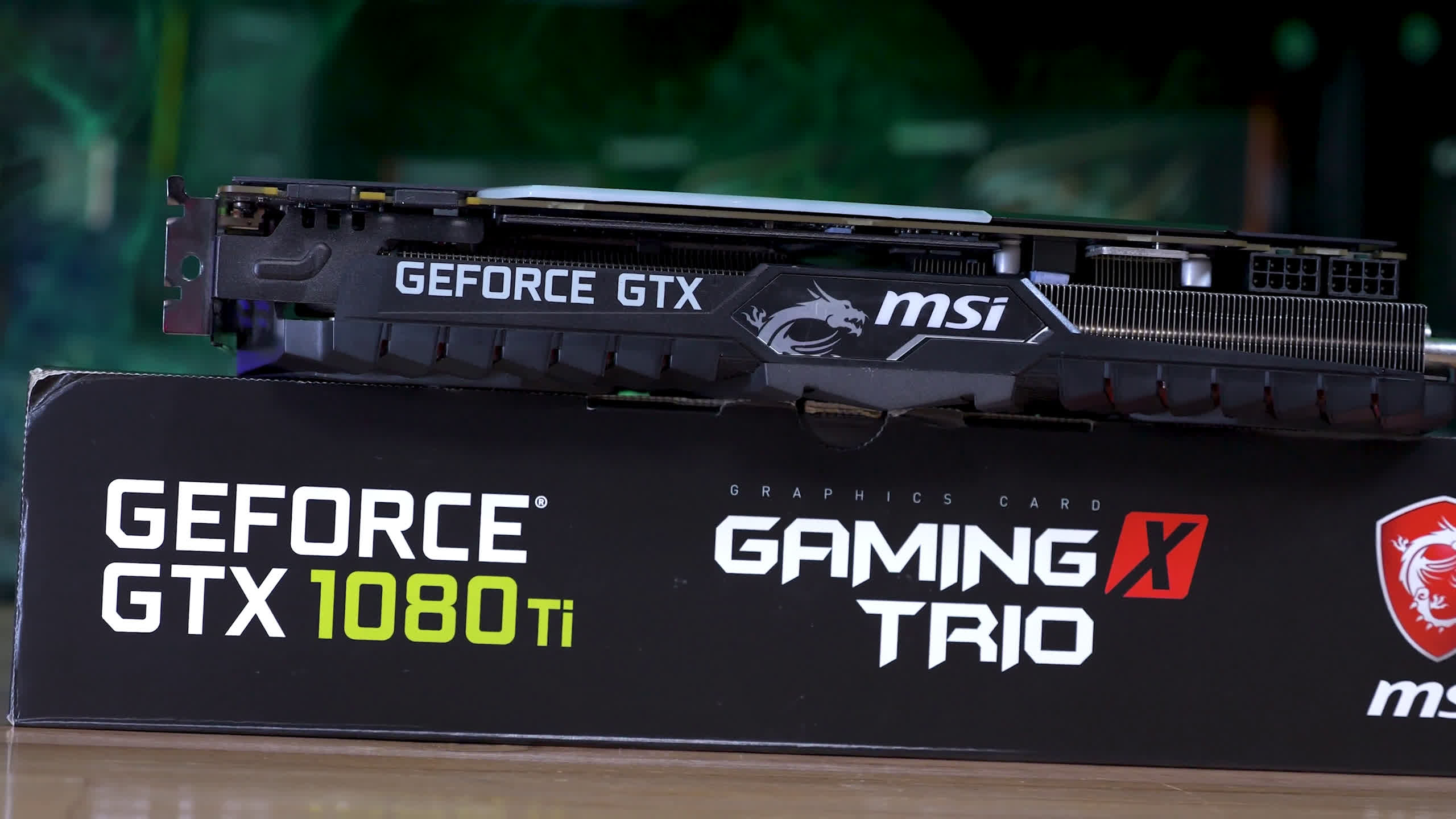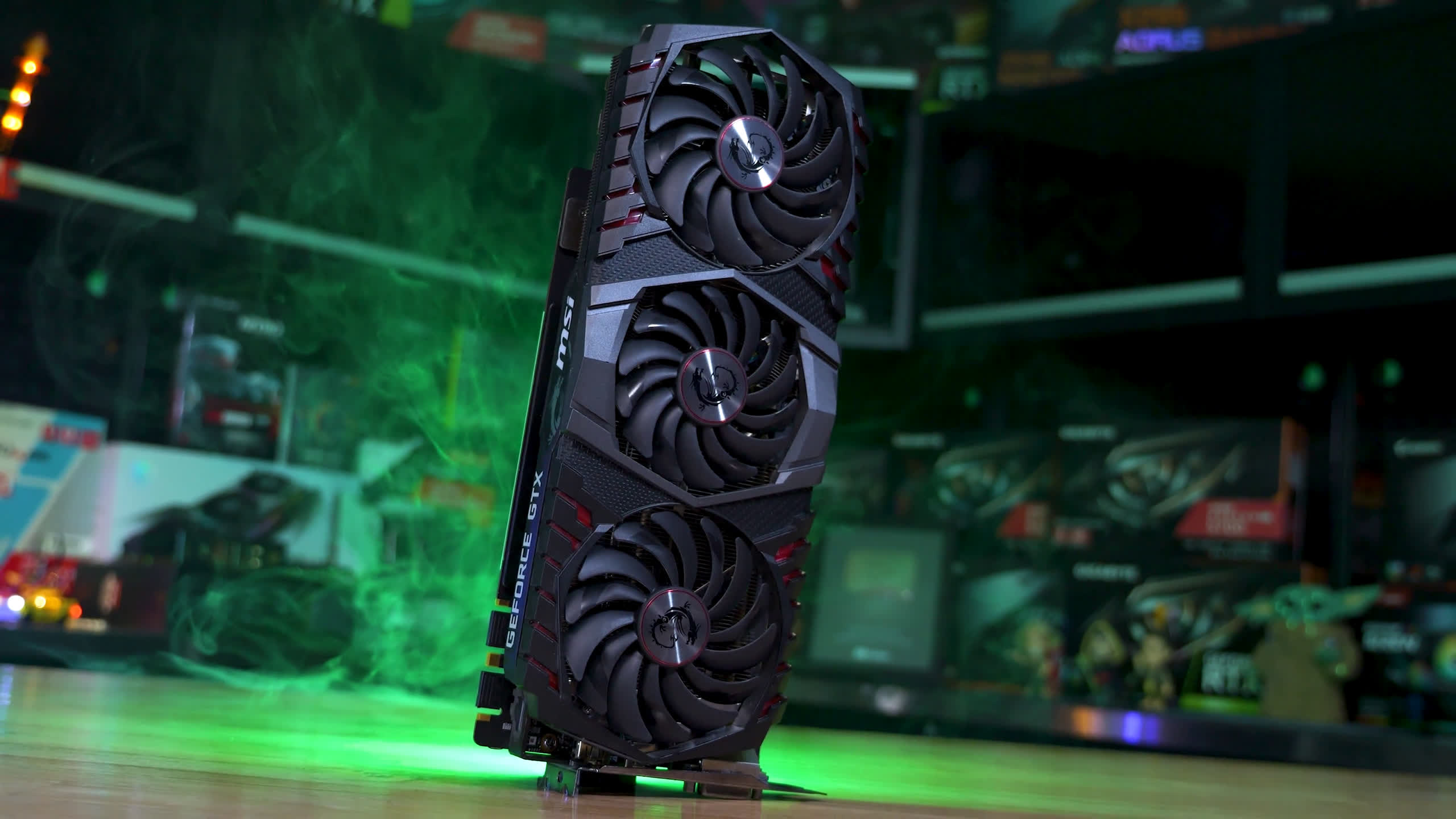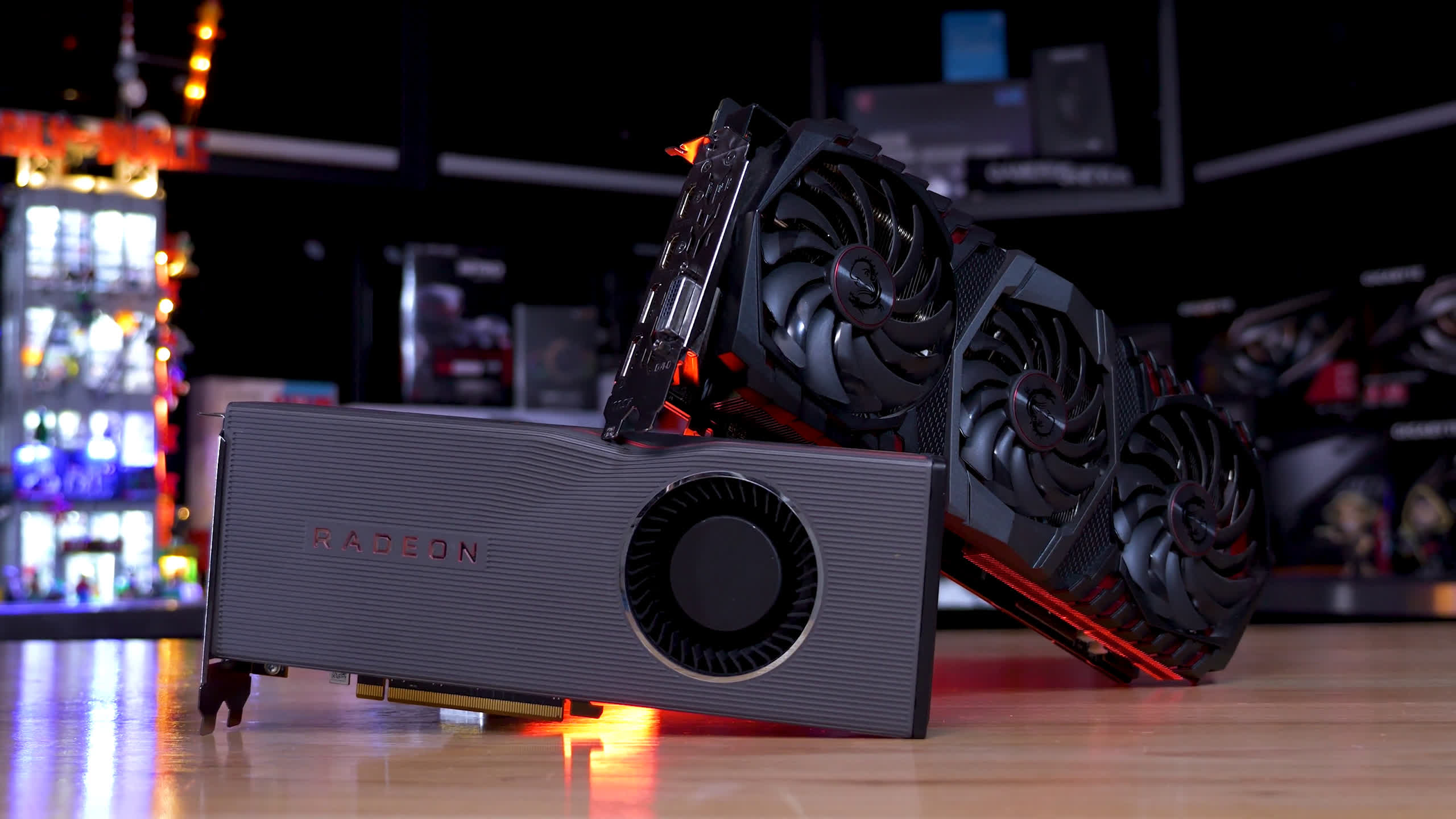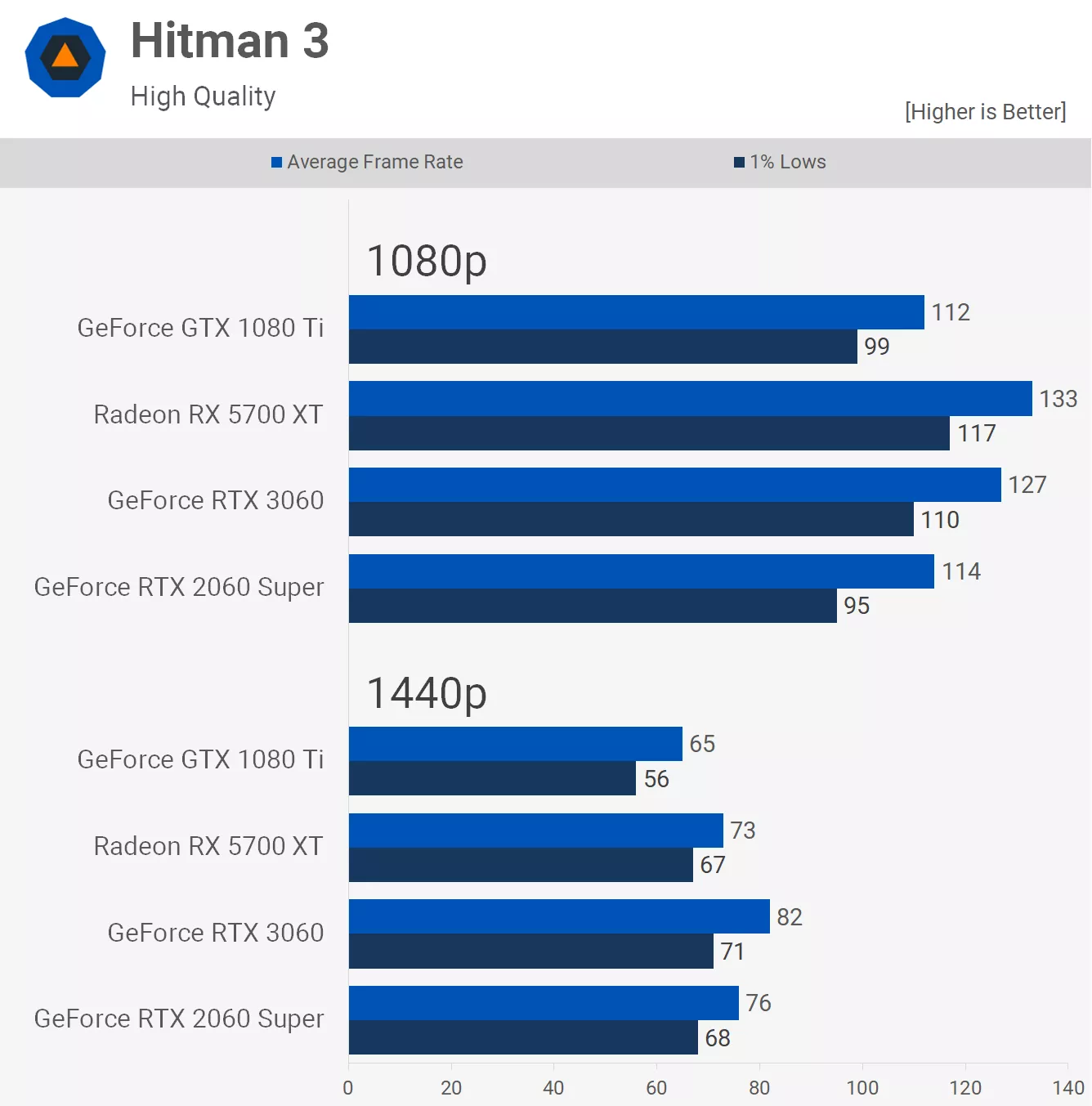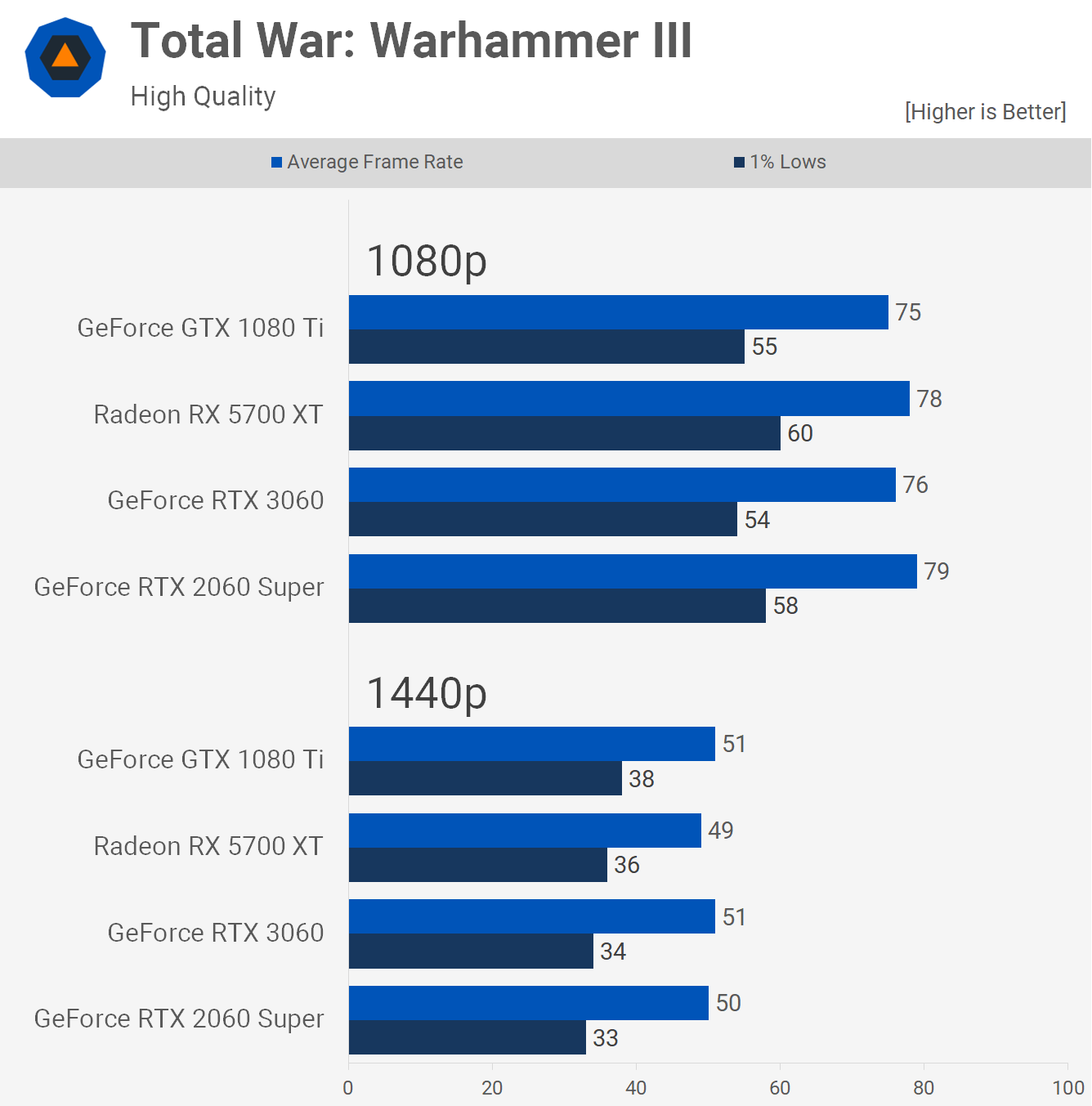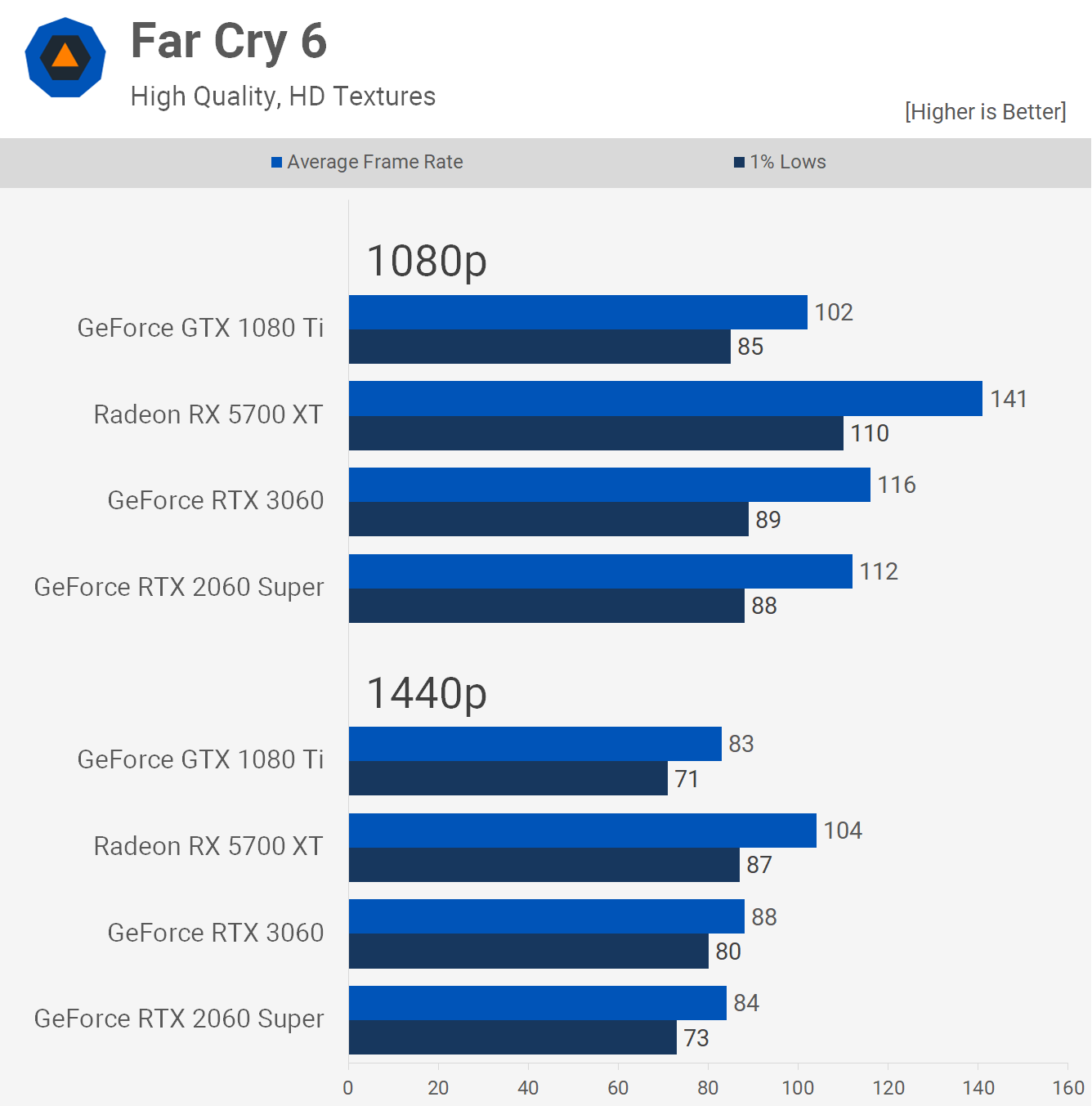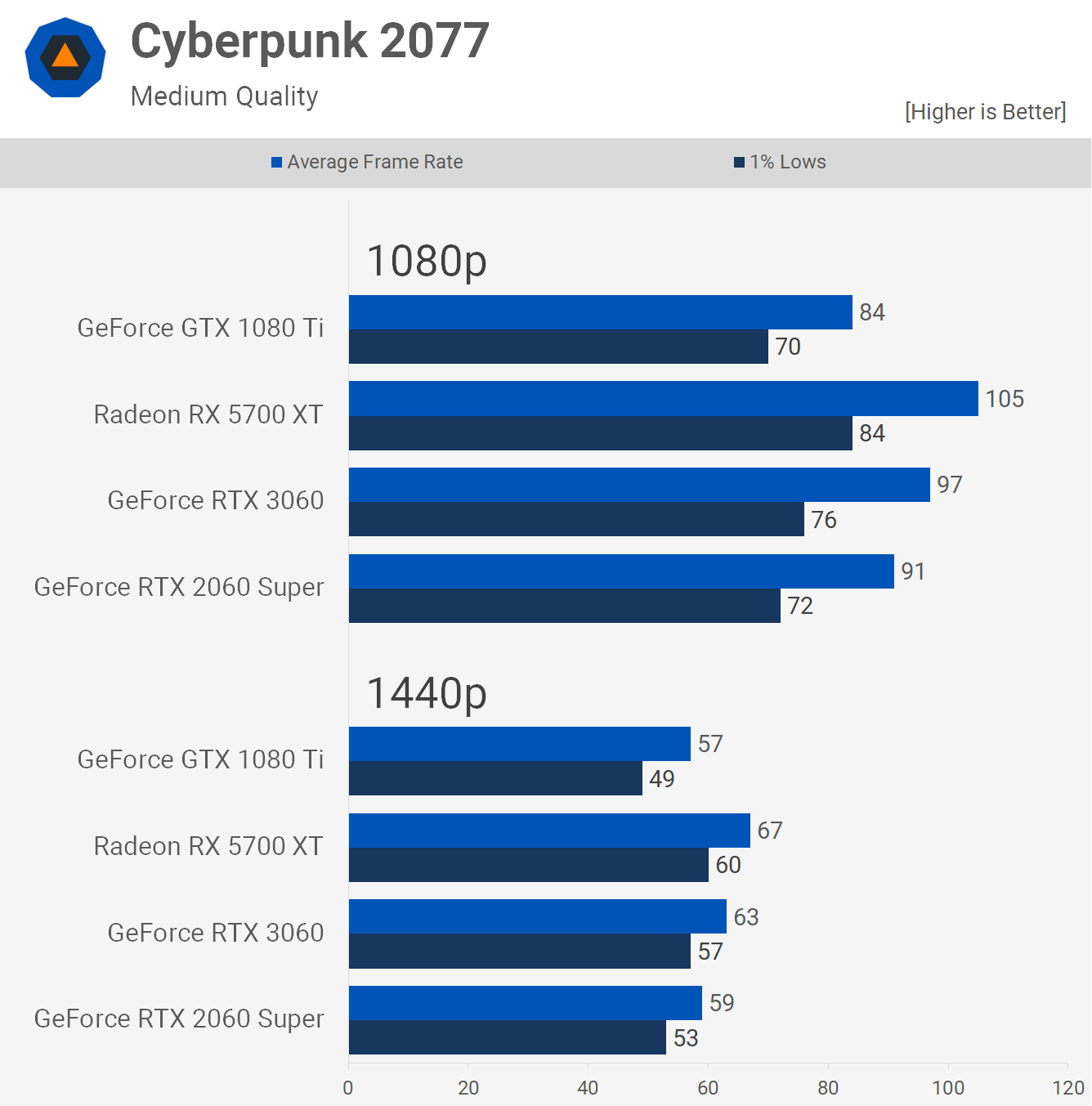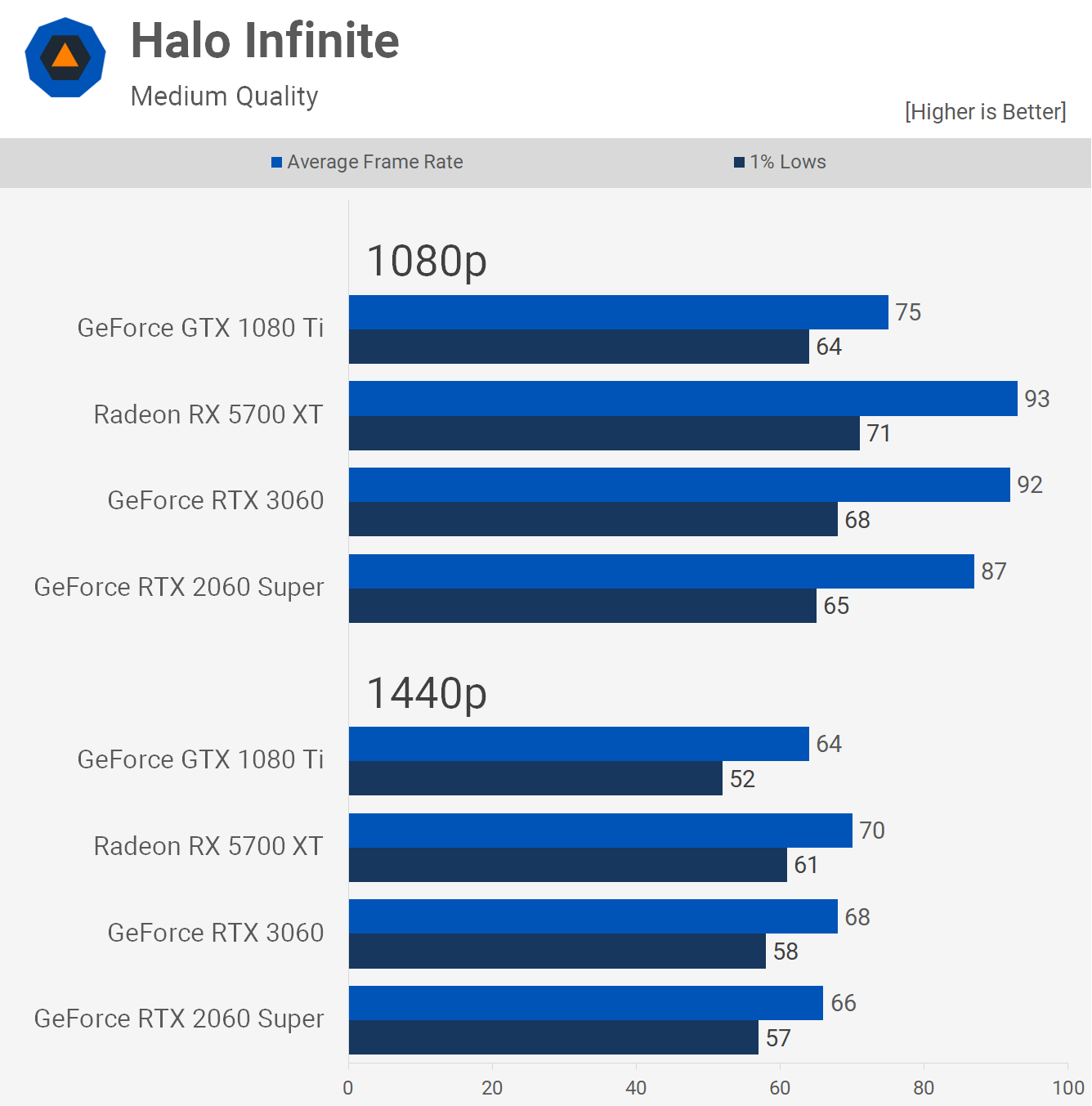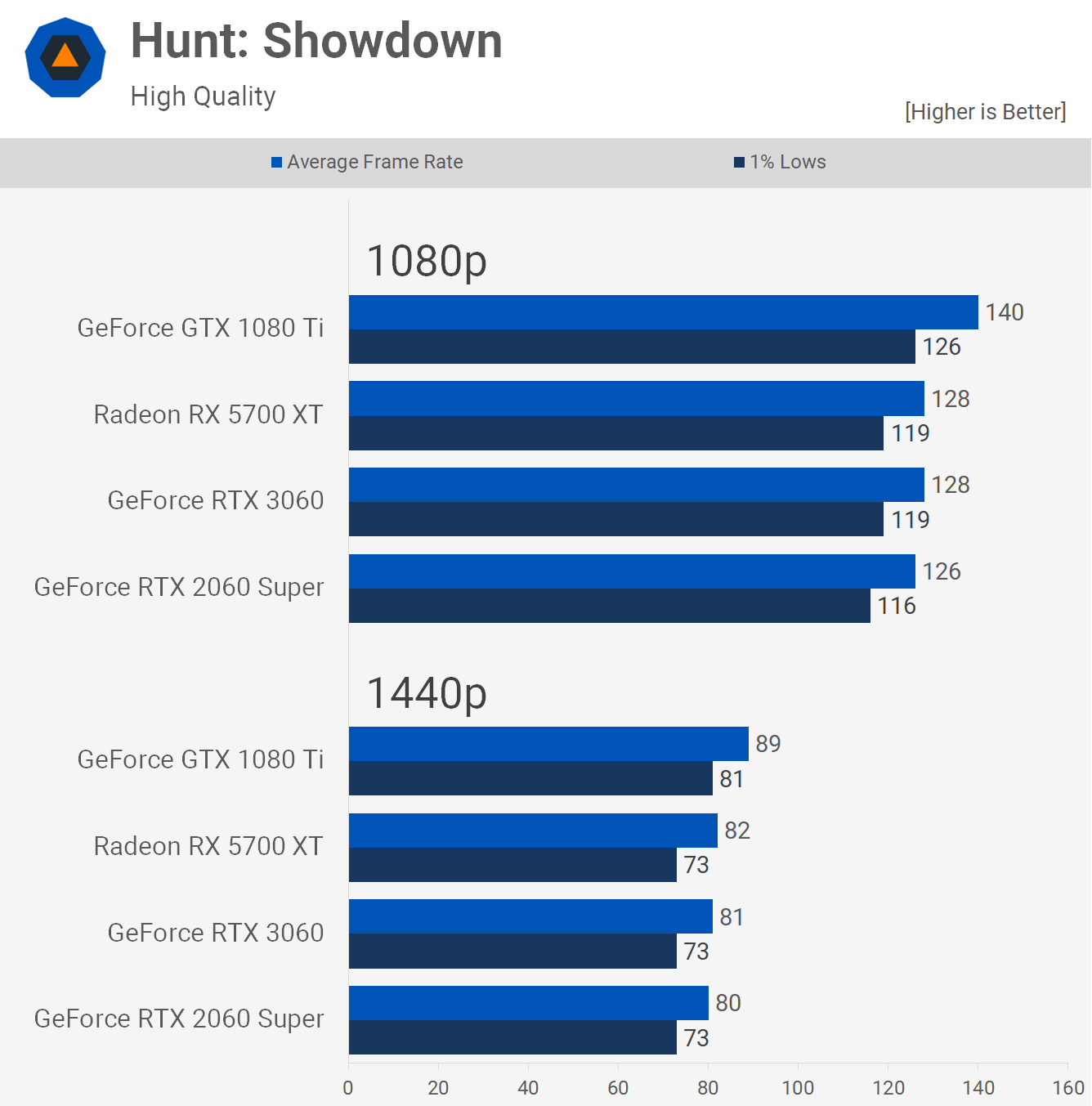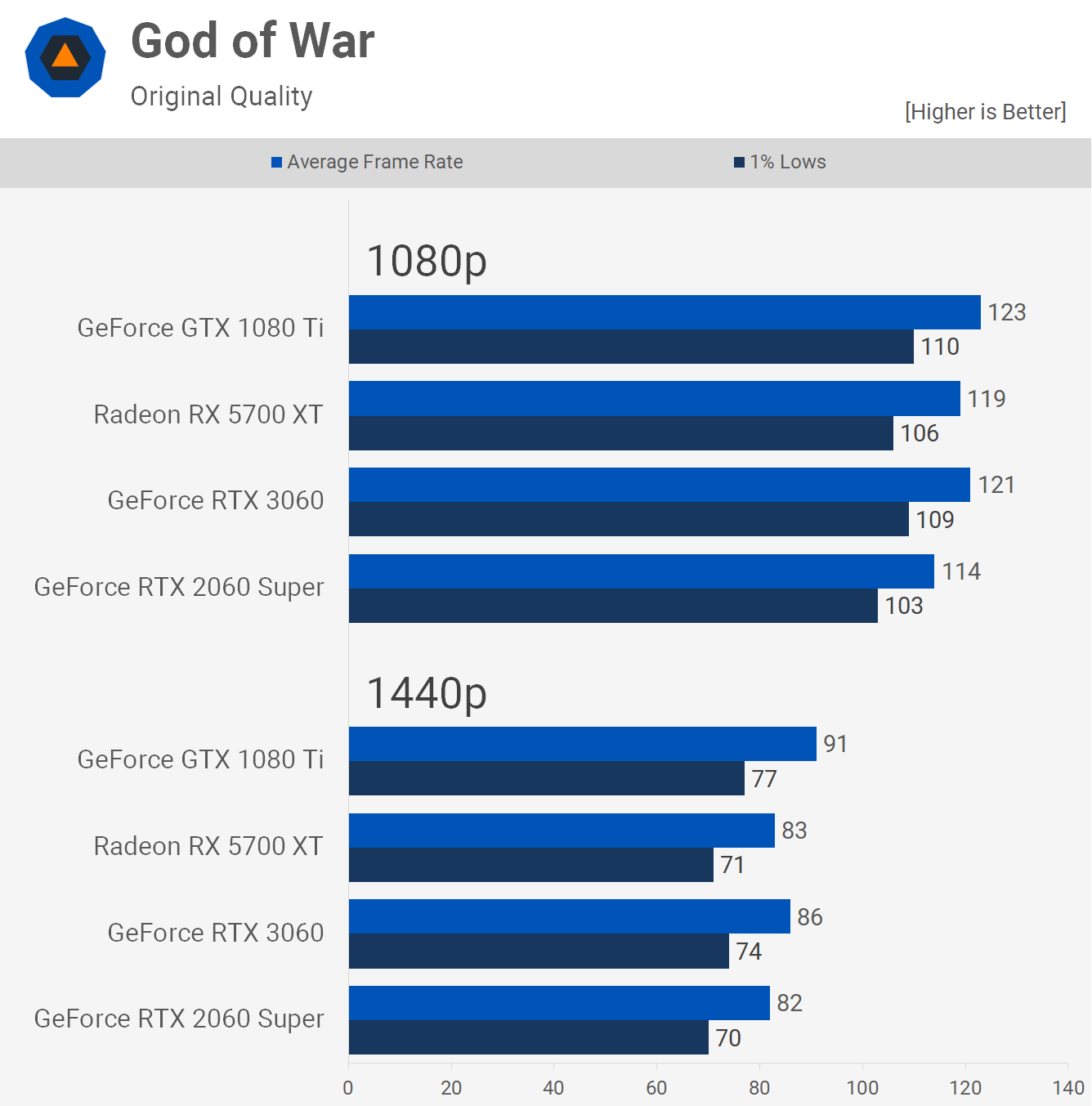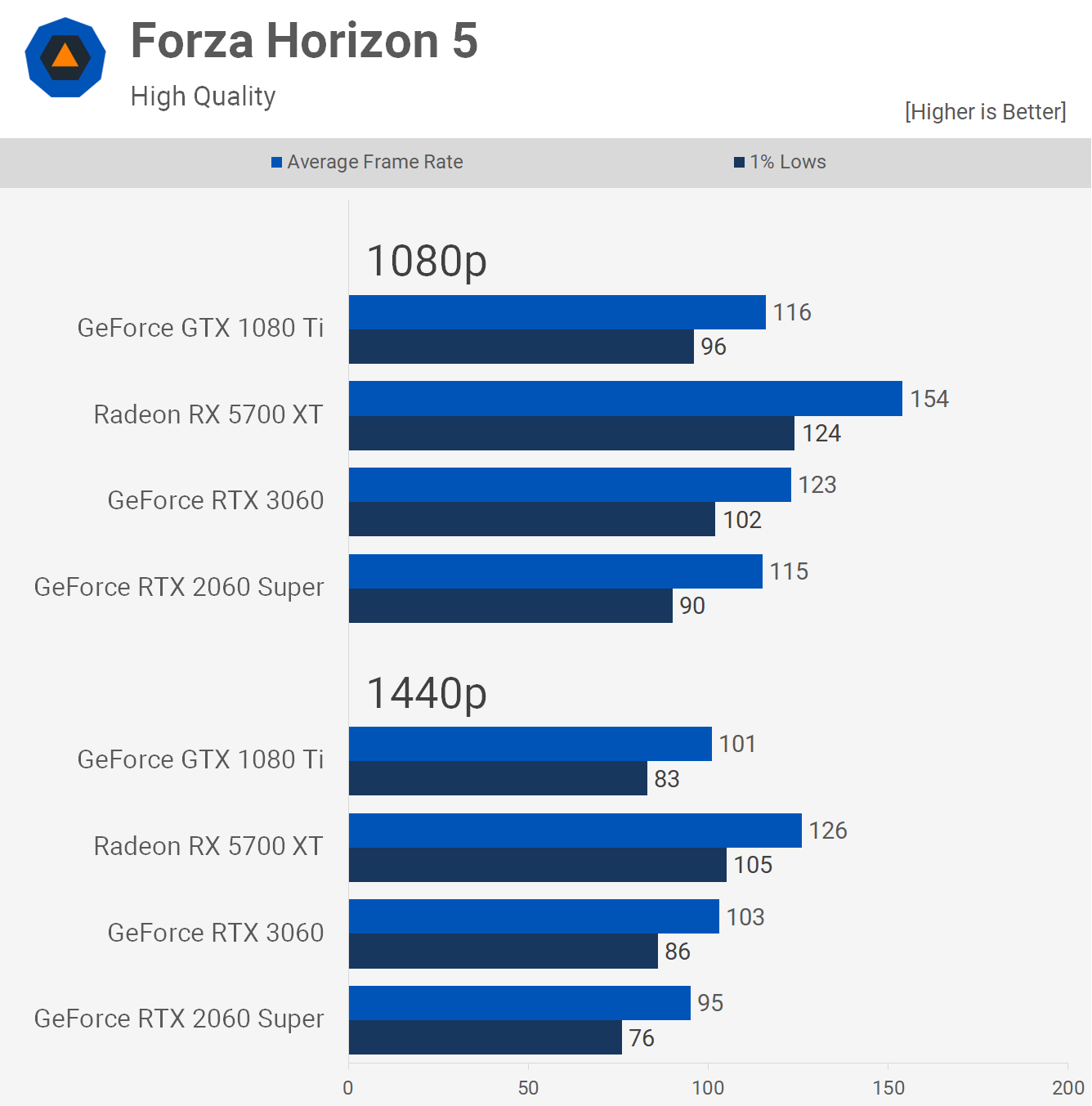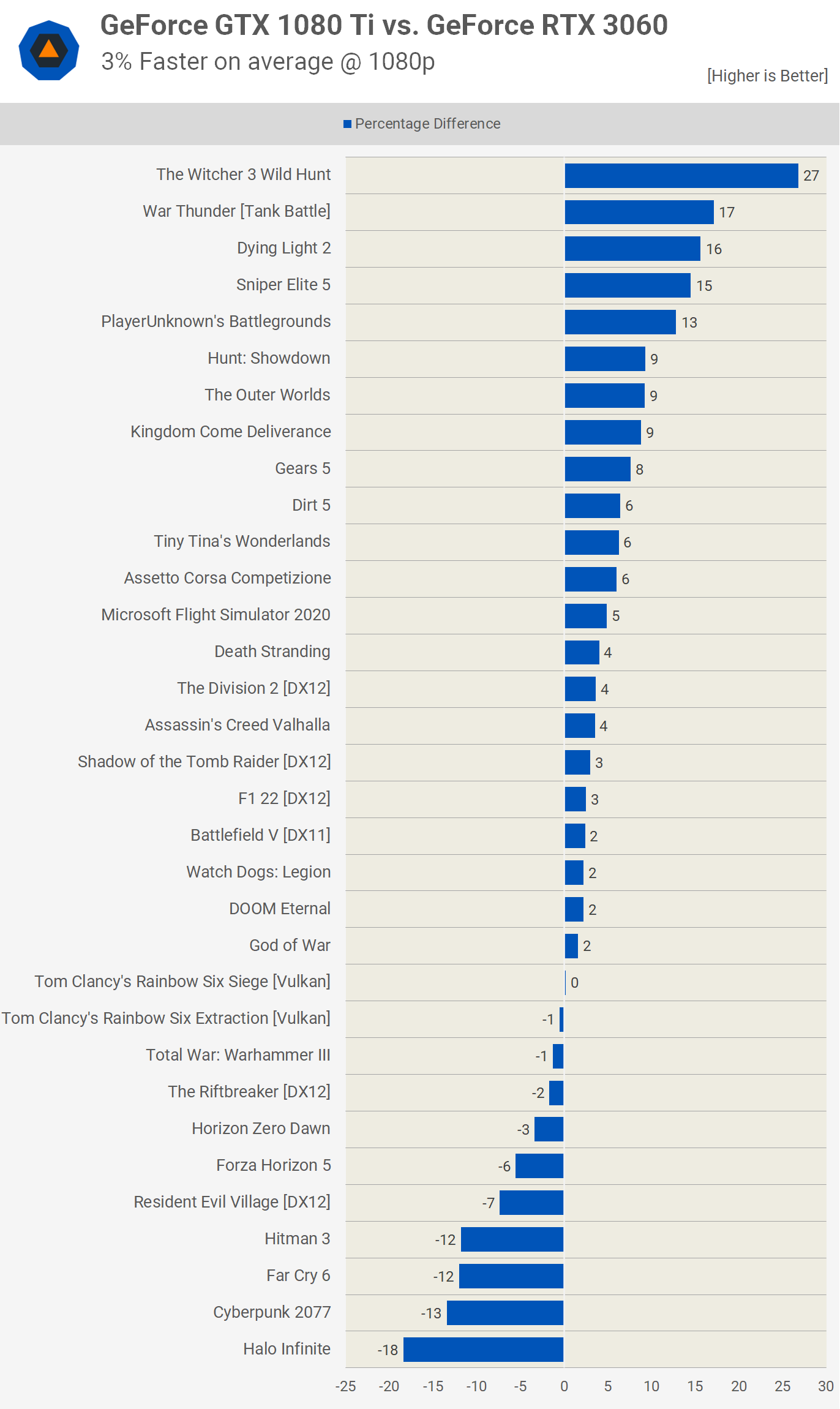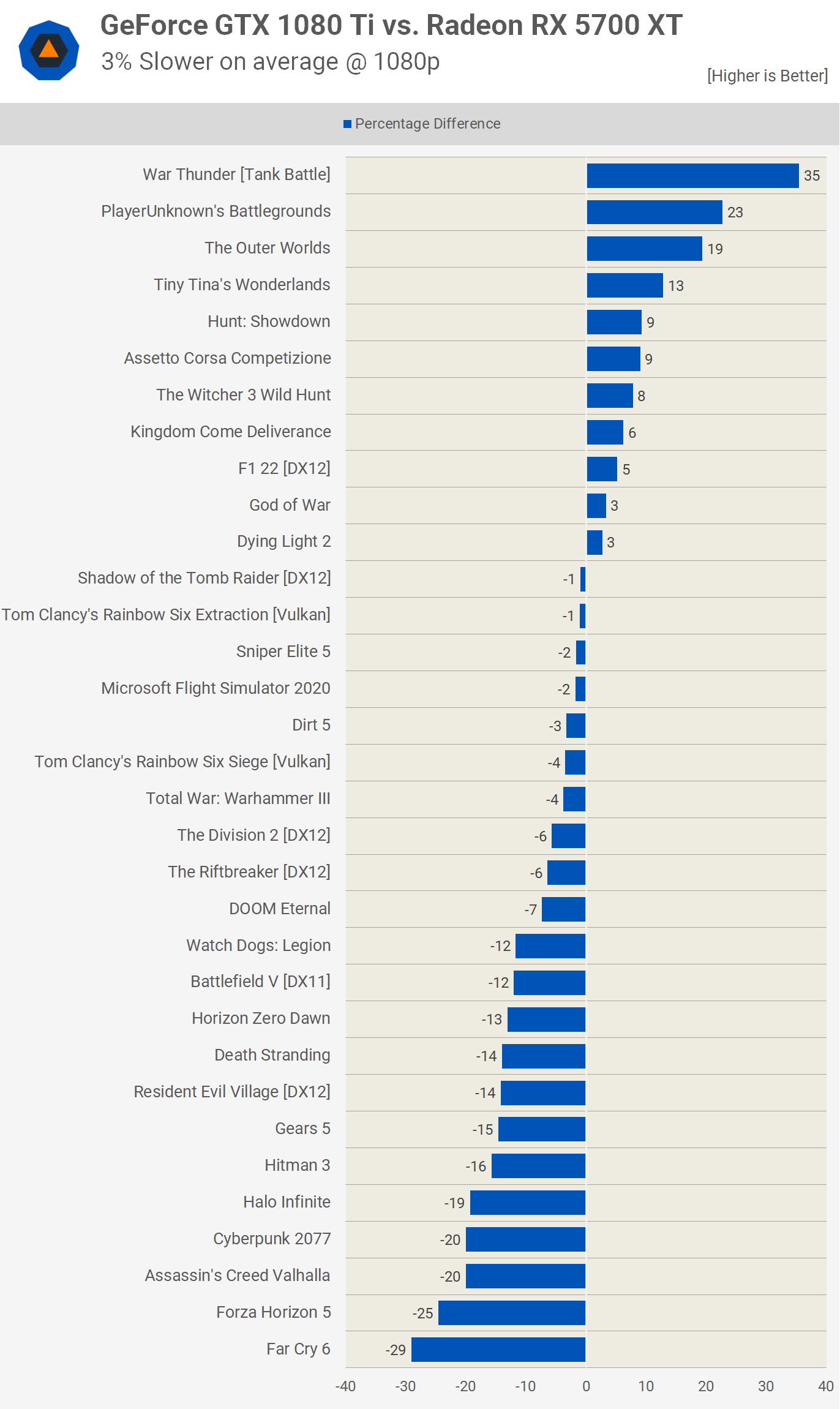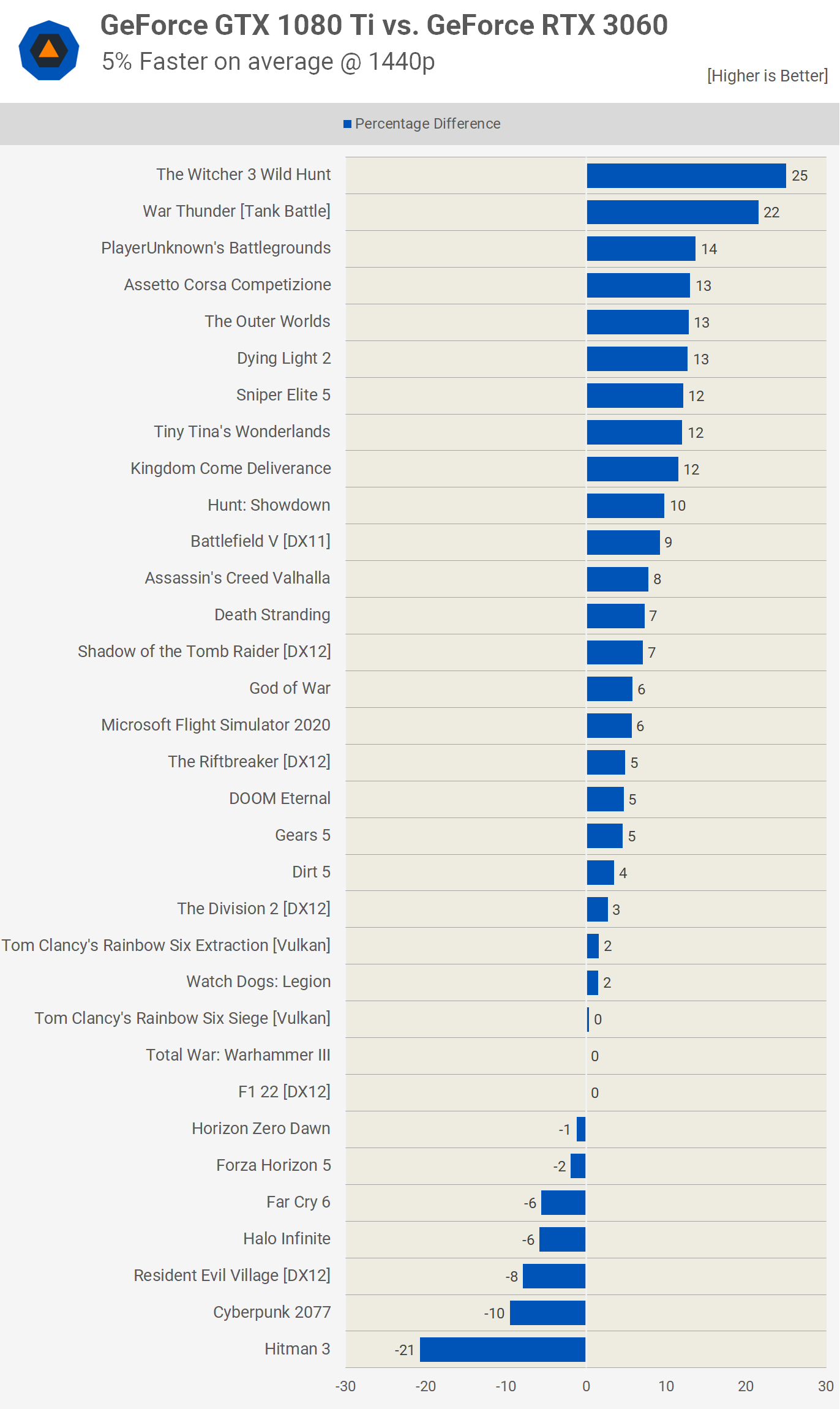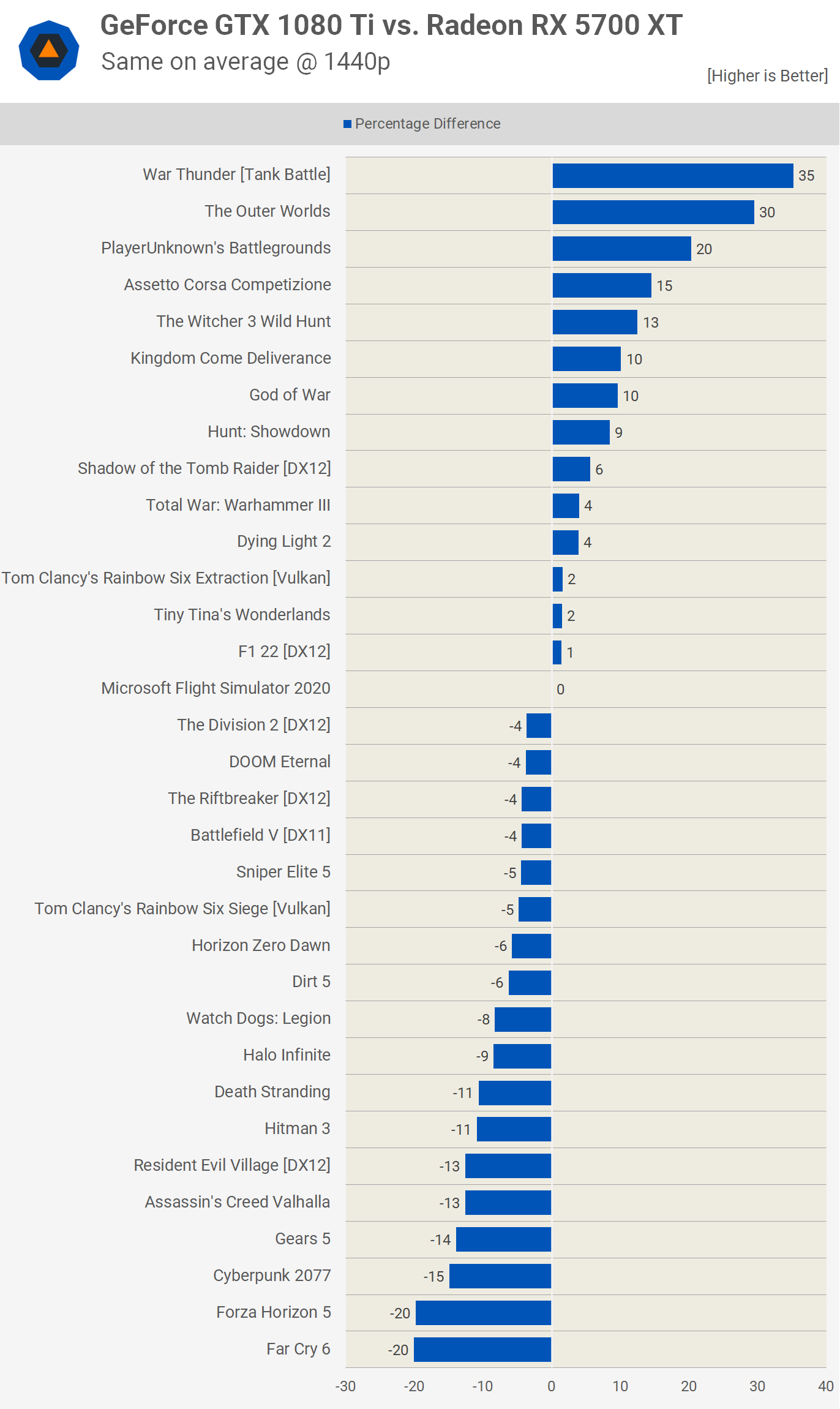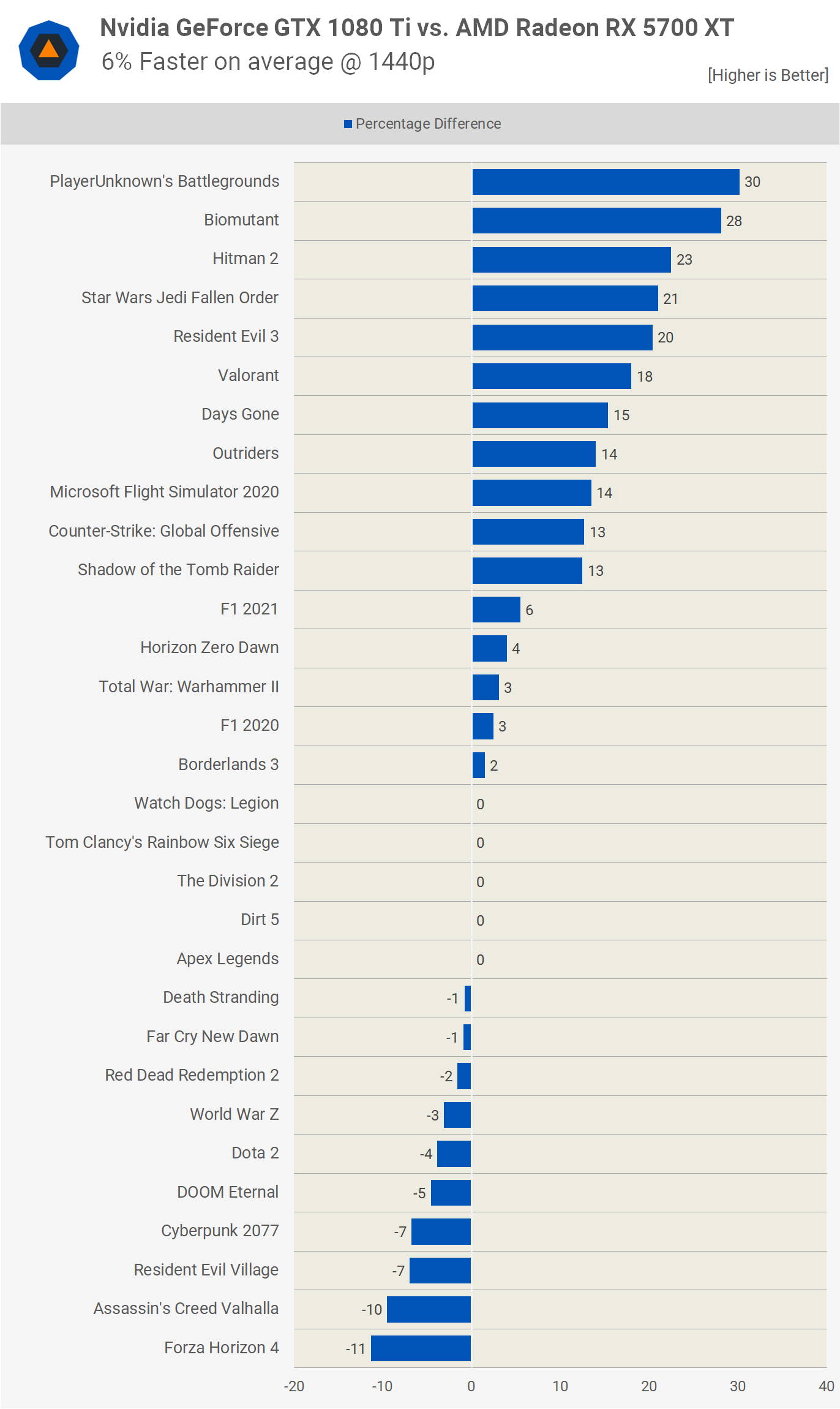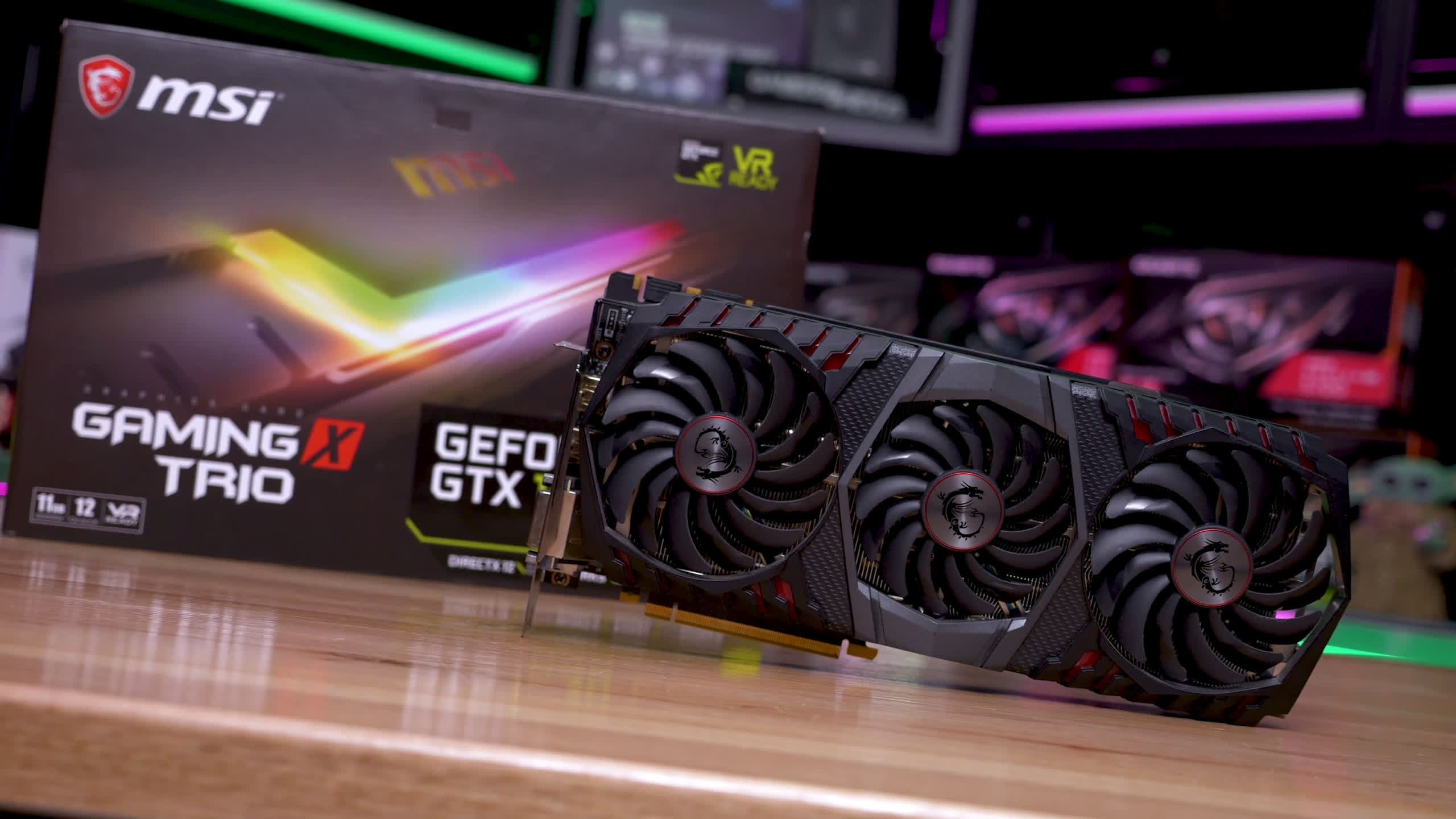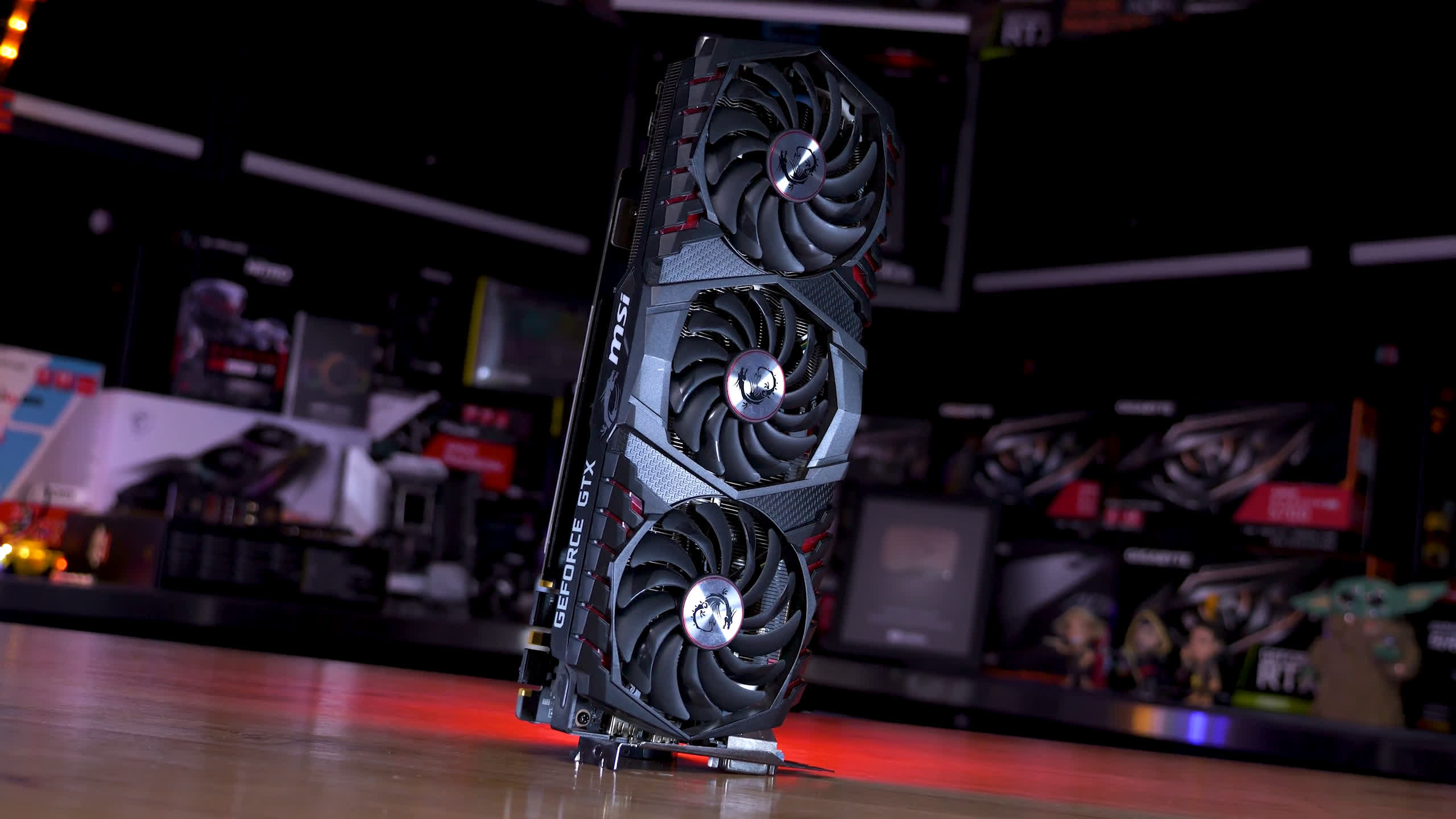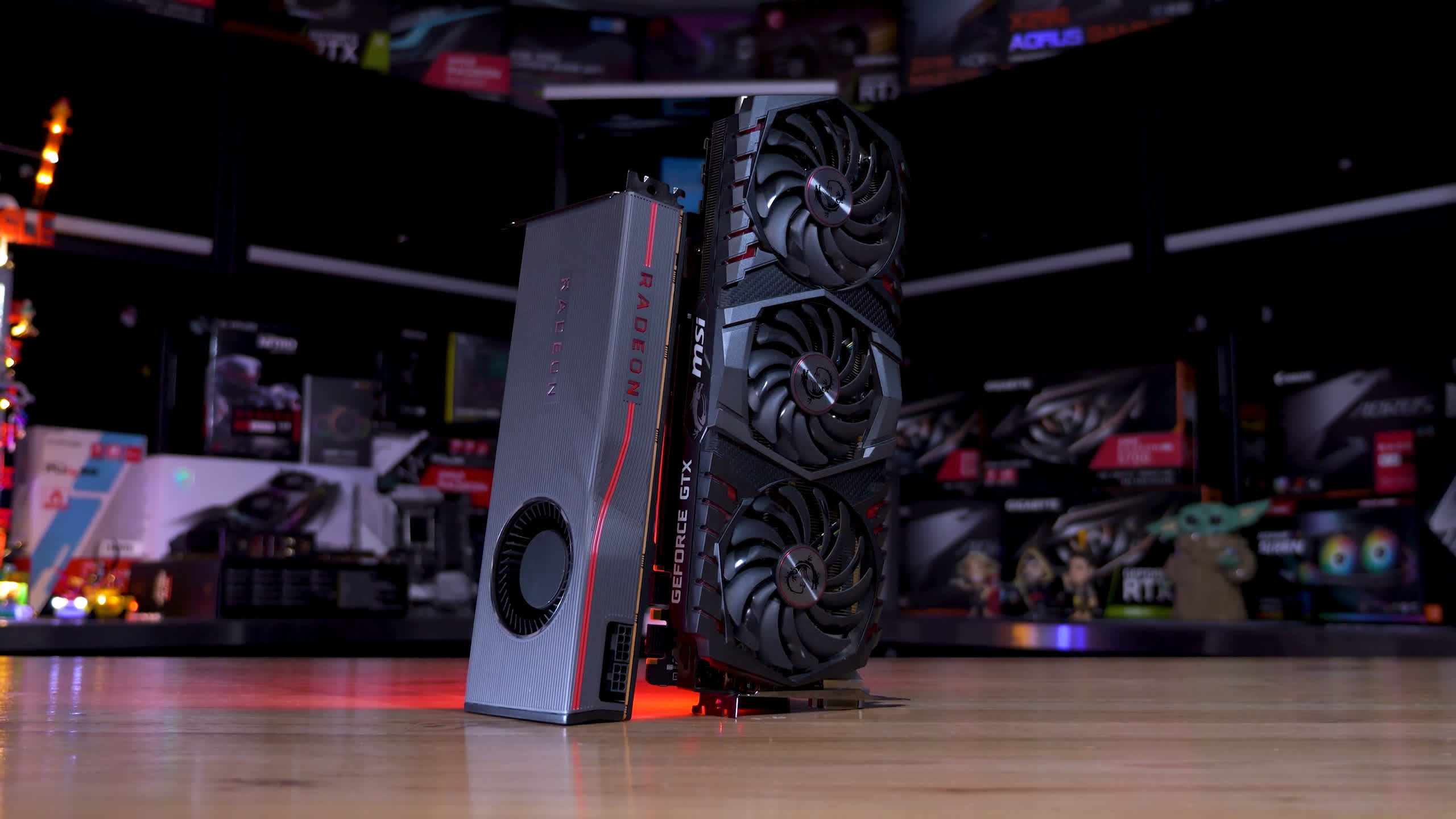Looking back at 2017, the GeForce GTX 1080 Ti had virtually no competition, unless you count the Radeon Vega 64 Liquid which we very much don't. It's almost unthinkable to say this, but $700 seems very reasonable for a flagship graphics card today. Oh, how times have changed.
Anyway, we're not here to feed into your growing GPU depression, and maybe, just maybe we can put a positive spin on this one. Not sure how, but we'll work that out as we go...
For this mega 50 game comparison and revisit we've got two reference points: one is the current-gen RTX 3060 which is currently selling for slightly less than $400, along with a previous-gen Radeon GPU that we also recently revisited, the Radeon 5700 XT.
So let's go over the test system specs and then jump into the data.
For testing we're using our Ryzen 7 5800X3D test system using 32GB of DDR4-3200 CL14 memory along with the latest available display drivers. Resizable Bar was enabled for all games tested at 1080p and 1440p, and we'll take a close look at the data for about a dozen of the titles tested before jumping into the usual breakdown graphs.
Benchmarks
Starting with Hitman 3, we find that the GTX 1080 Ti is still a very capable graphics card, despite coming in well behind both the 5700 XT and RTX 3060. The 1080p results see it roughly match the RTX 2060 Super, which means it was 16% slower than the 5700 XT and 12% slower than the RTX 3060.
Even at 1440p, we're still looking at over 60 fps on average, so certainly very playable, though the 5700 XT was 12% faster and the RTX 3060 26% faster.
Still, we think it's fair to say that the flagship Pascal GeForce GPU has aged rather well.
The Warhammer III results are surprisingly competitive as all four tested GPUs delivered virtually identical performance at 1080p and 1440p.
That being the case, the GTX 1080 Ti looks good here, especially if you consider that for a new RTX 3060 you're looking at having to pay around $400 right now. The Radeon 6600 is a much better deal and value, but the point remains that for a 5-year-old GPU, the 1080 Ti remains very capable.
The GTX 1080 Ti also provides highly playable frame rates in Far Cry 6 using the high quality preset with HD textures enabled. The Radeon 5700 XT which is one generation ahead does benefit from support for Resizable BAR though, giving it a massive performance boost over the 1080 Ti, delivering almost 40% more frames at 1080p and 25% more at 1440p.
When compared to newer GeForce GPUs, the 1080 Ti is comparable to today's $400 options from Nvidia.
The GTX 1080 Ti is able to hit full stride in older games such as War Thunder, where it's actually quite a bit faster than not just the 5700 XT, but also newer mid-range GeForce GPUs such as the RTX 3060.
At 1440p, the 1080 Ti is a full 35% faster than the 5700 XT and 22% faster than the RTX 3060.
Next we have Rainbow Six Siege and this is another older title which Pascal will be well optimized for. As a result the GTX 1080 Ti does really well, pumping out well over 300 fps at 1080p, placing it alongside the 5700 XT and RTX 3060.
It's a similar story at 1440p, the 5700 XT had a slight performance advantage, but we're talking about a mere 5% difference.
Cyberpunk 2077 is a fairly poor showing for the old GTX 1080 Ti, especially relative to the newer mid-range GPUs. At 1080p the 5700 XT was 25% faster, the RTX 3060 15% faster and the RTX 2060 Super 8% faster.
That said, the 1080 Ti did fare a lot better at 1440p as the 5700 XT was 18% faster and the RTX 3060 just 11% faster, so not too bad, though we are only looking at 57 fps on average.
We think it's fair to say all tested GPUs delivered more than enough frames in Death Stranding, even at 1440p, so the GTX 1080 Ti is holding on very well in this game, outpacing the RTX 3060 by a small margin at both resolutions. The Radeon 5700 XT continues to impress with surprisingly strong performance, beating the 1080 Ti by a 16% margin at 1080p and 12% at 1440p.
Moving on to F1 22 we have another game where the GTX 1080 Ti is delivering exceptional performance with 201 fps at 1080p using the high quality preset.
Sure, you can't use ray tracing, which is also the case with the 5700 XT, but in our opinion RT brings almost nothing to F1 22. Admittedly, it does look good for screenshots, but as for playing the game, you'll be hard pressed to notice the differences.
Anyway, all GPUs were tested here with RT effects disabled and that means the 1080 Ti and 3060 are basically identical in terms of performance, and so is the 5700 XT.
Performance in ACC is also excellent as the GTX 1080 Ti was good for 193 fps at 1080p and 165 fps at 1440p, using the medium quality settings. So if you wanted to, you could increase the visual quality in this racing game and still receive a high refresh rate experience. The GTX 1080 Ti was also faster than the 5700 XT and the RTX 3060 at both tested resolutions.
Halo Infinite is a more recent title where the GTX 1080 Ti doesn't perform well relative to newer mid-range GPUs. At 1080p, for example, the 5700 XT was 24% faster and the RTX 3060 23% faster. Even the RTX 2060 Super was 16% faster.
This is a weak result for the aging Pascal flagship, however the 1440p results were more competitive as the 1080 Ti delivered similar results to that of the 2060 Super.
Hunt: Showdown is 4.5 years old at this point, so it's an older title that Pascal should be well optimized for and that does appear to be the case, as the 1080 Ti was 9% faster than the 5700 XT and RTX 3060 at both tested resolutions.
Pascal works really well in God of War and here the GTX 1080 Ti can be seen delivering RTX 3060-like performance, making it slightly faster than the 5700 XT and RTX 2060 Super. A good result for the old GeForce GPU.
Forza Horizon 5 benefits massively from Resizable Bar and that's one of the key reasons why the 5700 XT annihilates the GTX 1080 Ti in this title, offering 33% more performance at 1080p and 25% more at 1440p. The GTX 1080 Ti doesn't perform poorly when compared to GeForce GPUs though, as it roughly matched the RTX 3060 in this game.
Performance Summary
It's hard to say how all these GPUs compare overall based on the mixed sample of games we just looked at. Sometimes the GTX 1080 Ti was much faster than both the 5700 XT and RTX 3060, while many others much slower, and of course, there were instances where the results were all much the same. Since we've tested 50 games in total, let's go check out the full breakdown...
In the GTX 1080 Ti vs. RTX 3060 comparison, at 1080p we find that on average the old GTX 1080 Ti is 3% faster on average. The former GeForce flagship enjoyed some pretty big wins, though admittedly most of them were in older games.
By contrast, all the games where the 1080 Ti lost by double-digit margins were released in the last two years. Overall though, these two GPUs are roughly on par in terms of performance.
Compared to the Radeon 5700 XT at 1080p, the margin swings the opposite way, even if it's an insignificant margin, but here the GeForce GPU was 3% slower.
Once again we see it's in older games or games that rely on the Unreal Engine where the GTX 1080 Ti performs best, meanwhile newer titles like Far Cry 6, Forza Horizon 5, Assassin's Creed Valhalla, Cyberpunk 2077, Halo Infinite, and Hitman 3 all heavily favor the Radeon GPU. Without question RDNA has aged better than Pascal, and will almost certainly continue to do so.
Moving on to 1440p, the margin overall is much the same when compared to the RTX 3060, in favor of the older GTX 1080 Ti by 5%.
Older games like The Witcher 3 and War Thunder, or Unreal engine games such as PUBG and The Outer Worlds is where the GTX 1080 Ti does best, while it's typically the latest titles where it performs at its worst.
Now looking at the 5700 XT comparison at 1440p, we find that performance is a tie overall, which is probably more impressive for the Radeon GPU given it was quite a bit cheaper, though it did arrive two years later, so that's to be expected even in today's GPU market.
It's also worth noting that last year we compared the GTX 1080 Ti and 5700 XT in 35 games at 1440p and found that the GeForce GPU was 6% faster on average. Of course, we used a different game sample and many of the newly released games where the GTX 1080 Ti didn't fare all that well weren't included back then.
Still King
Purely from a performance standpoint, five years on and the GTX 1080 Ti is still going strong. Maybe if you snapped one up for $700 back in 2017 because you demanded the best, there's a good chance you've since moved on. Probably not to Turing, as the RTX 2080 / 2070 Super delivered a similar level of performance for similar money, but we recon many would have been tempted by Ampere, should they have been lucky enough in the last 2 years to find an RTX 3080 at or near the MSRP.
Upon release, the RTX 3080 was almost 60% faster than the GTX 1080 Ti at 1440p and almost 80% faster at 4K, which is a massive upgrade for those holding out. As we've mentioned before though, right now we don't recommend buying a high-end GPU with next gen models just around the corner.
As we just saw, the GTX 1080 Ti is comparable to the RTX 3060 in terms of performance, and given the mid-range Ampere GPU retails for around $380 right now, the GTX 1080 Ti was 84% more expensive, though keep in mind the 3060 is meant to cost $330.
Not too bad in terms of GPU progress when you look at it that way. The Radeon 5700 XT which is also comparable to the RTX 3060 and GTX 1080 Ti in terms of performance sold for $400 back in 2019, so that's a bit of a buzzkill for the RTX 3060.
The Radeon RX 6600 XT is ~$40 less than the RTX 3060 and offers comparable performance, so our advice for the past few months has been to either hold out for next gen GPUs. If you're more of a budget shopper, snap up a Radeon 6600 non-XT for just $260. At that price, the XT version is a little over 30% more expensive and on average only delivers around 15% more performance, so the RX 6600 is the value king in our opinion.
It also means you're getting within 15% of the GTX 1080 Ti for under half of what you'd have paid back in 2017, which is not bad at all.
A few years after release, it's good to see the GTX 1080 Ti is still going strong. It is showing some signs of dropping off in newer titles, though performance remains acceptable. It's also nice to see how newer GPUs can deliver a similar level of performance for considerably less money. We always love to see that.
